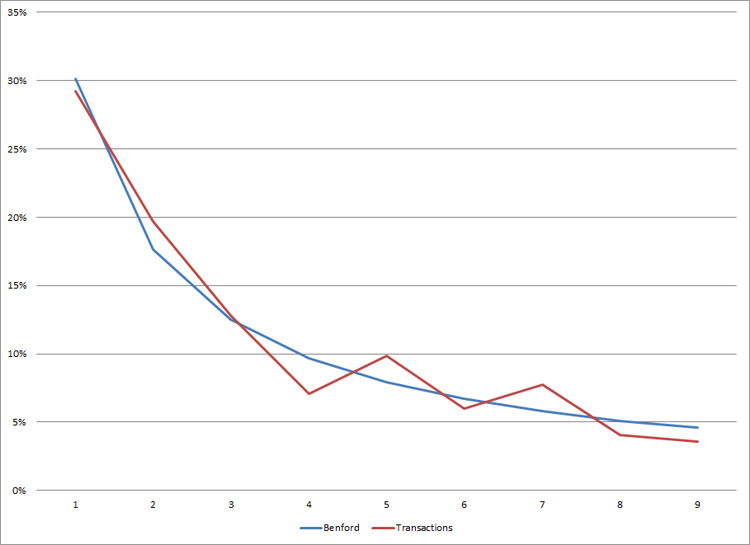I've gotten several questions on you might implement Benford's Law, which was a previous post I wrote. If you haven't read it and you aren't familiar, you'll need to look it over for this to make sense.
As a reminder, non-random numbers (which includes financial transactions) should occur at the following frequencies for their first digits:

We will keep this C# code fairly straightforward so anybody can try it out. Therefore, rather than a database or anything too fancy, we'll just import values from a CSV file stored at C:\Transactions.csv on your local drive. We will then import each row as a decimal into an array.
private static double[] GetTransactionsFromFile()
{
try
{
string[] allLines = File.ReadAllLines(@"C:\Transactions.csv");
double[] allTransactions = new double[allLines.Length];
for (int i = 0; i < allLines.Length; i++)
{
double lineValue;
if (double.TryParse(allLines[i], NumberStyles.Currency, new CultureInfo("en-US"), out lineValue))
{
allTransactions[i] = lineValue;
}
else
{
Console.WriteLine("Line #" + (i + 1) + " is not a valid dollar amount. Please fix and restart the program.");
return null;
}
}
return allTransactions;
}
catch(FileNotFoundException ex)
{
Console.Write(ex.Message);
Console.WriteLine(" Did you copy the example file or create a new file at that location?");
}
return null;
}
This line of code, excerpted from the above section, will properly remove currency and commas, based on the computer's locale.
double.TryParse(allLines[i], NumberStyles.Currency, new CultureInfo("en-US"), out lineValue)
This will pull the first digit of every value in the array:
private static double[] GetFirstDigitFrequency(double[] allTransactions)
{
double[] firstDigitFrequency = new double[10];
for (int i = 0; i < allTransactions.Length; i++)
{
int firstDigit = int.Parse(allTransactions[i].ToString().Substring(0, 1));
firstDigitFrequency[firstDigit]++;
}
return firstDigitFrequency;
}
This will output any first digits that don't fall within a tolerance of 50% above or below the expected rate of occurrence. It omits first digit frequencies that lack any transactions and also throws a warning if you don't have at least 25 transactions.
private static void OutputResults(double[] firstDigitFrequency)
{
double allowedTolerance = 0.5;
double total = firstDigitFrequency.Sum();
double frequencyPercentage;
double benfordPercentage;
if (total < 25)
Console.WriteLine("You have a low number of transactions which reduces the effectiveness of the test.");
for (int i = 1; i < 10; i++)
{
if (firstDigitFrequency[i] == 0)
break;
frequencyPercentage = firstDigitFrequency[i] / total;
benfordPercentage = Math.Log10(1 + 1.0 / i);
if ((frequencyPercentage < (benfordPercentage * (1 - allowedTolerance))) || (frequencyPercentage > (benfordPercentage * (1 + allowedTolerance))))
Console.WriteLine("Review transactions with a first digit of: " + i);
}
Console.WriteLine("Complete.");
}
The complete source code:
using System;
using System.Globalization;
using System.IO;
using System.Linq;
namespace ClarkOnCode_FraudDetection
{
class Program
{
static void Main(string[] args)
{
double[] allTransactions = GetTransactionsFromFile();
double[] firstDigitFrequency = GetFirstDigitFrequency(allTransactions);
OutputResults(firstDigitFrequency);
Console.ReadLine();
}
private static void OutputResults(double[] firstDigitFrequency)
{
double allowedTolerance = 0.5;
double total = firstDigitFrequency.Sum();
double frequencyPercentage;
double benfordPercentage;
if (total < 25)
Console.WriteLine("You have a low number of transactions which reduces the effectiveness of the test.");
for (int i = 1; i < 10; i++)
{
if (firstDigitFrequency[i] == 0)
break;
frequencyPercentage = firstDigitFrequency[i] / total;
benfordPercentage = Math.Log10(1 + 1.0 / i);
if ((frequencyPercentage < (benfordPercentage * (1 - allowedTolerance))) || (frequencyPercentage > (benfordPercentage * (1 + allowedTolerance))))
Console.WriteLine("Review transactions with a first digit of: " + i);
}
Console.WriteLine("Complete.");
}
private static double[] GetFirstDigitFrequency(double[] allTransactions)
{
double[] firstDigitFrequency = new double[10];
for (int i = 0; i < allTransactions.Length; i++)
{
int firstDigit = int.Parse(allTransactions[i].ToString().Substring(0, 1));
firstDigitFrequency[firstDigit]++;
}
return firstDigitFrequency;
}
private static double[] GetTransactionsFromFile()
{
try
{
string[] allLines = File.ReadAllLines(@"C:\Transactions.csv");
double[] allTransactions = new double[allLines.Length];
for (int i = 0; i < allLines.Length; i++)
{
double lineValue;
if (double.TryParse(allLines[i], NumberStyles.Currency, new CultureInfo("en-US"), out lineValue))
{
allTransactions[i] = lineValue;
}
else
{
Console.WriteLine("Line #" + (i + 1) + " is not a valid dollar amount. Please fix and restart the program.");
return null;
}
}
return allTransactions;
}
catch(FileNotFoundException ex)
{
Console.Write(ex.Message);
Console.WriteLine(" Did you copy the example file or create a new file at that location?");
}
return null;
}
}
}


